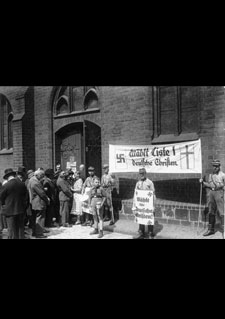The German Christians’ Election Campagne
Protestant church elections were scheduled for July 23, 1933. The church no longer made this decision since the “seizure of power”. The state, which had dictated a binding new church constitution and the date of the election in national law, now did instead. Elections were expected to clarify the seemingly uncertain ecclesio-political balance of power. Church councils and regional synods, which were chosen by church member in direct elections, were on the ballot.
A period of only nine days was planned. The condensed timeframe was intended to impede the assemblage of any movement to counter the German Christians. Even though the election’s impartiality was monitored by a representative of the Ministry of the Interior as stipulated by law and the government declared its neutrality, the NSDAP gave the German Christians biased support in the brief election campaign.
In confidential letters, the NSDAP’s national leadership called upon Gauleiters to support the German Christians in the election campaign organizationally and with propaganda so that, for reasons of prestige, the German Christians’ campaign would be victorious. The Party press took a position clearly partial to the German Christians and strongly emphasized how the German Christians guaranteed the cohesion of “Gospel and Volkstum” being striven for. Party members were even ordered to vote for German Christians and none of the reactionary lists of candidates. Defamed as “reactionary”, the opposition “Young Reformation movement” and Karl Barth’s list were severely hampered and put at a disadvantage by the NSDAP.
The culmination of the unscrupulous propagandistic rabble-rousing was Adolf Hitler’s radio address broadcast over the “Volksempfänger” or people’s receivers throughout all of Germany. On election Sunday itself, Nazi helpers in uniform stood side-by-side with the German Christians, Cross of Christ and swastika were intermingled everywhere.
The outcome of the church election turned out to be correspondingly clear. It ended with an overwhelming success for the German Christians who won a majority of 70% on average. Boosted by their electoral success, the German Christians set about organizing the German Evangelical Church as a “Reich Church” in keeping with the new church constitution that had become legally binding at this same time.

